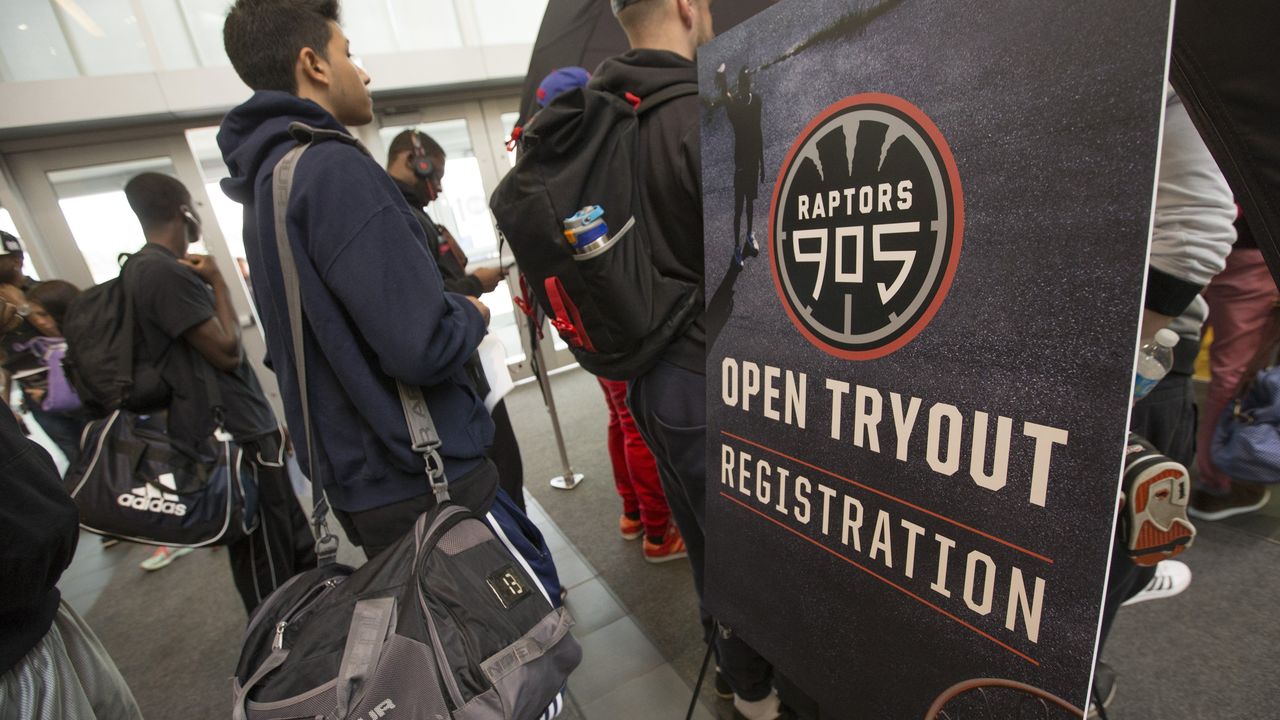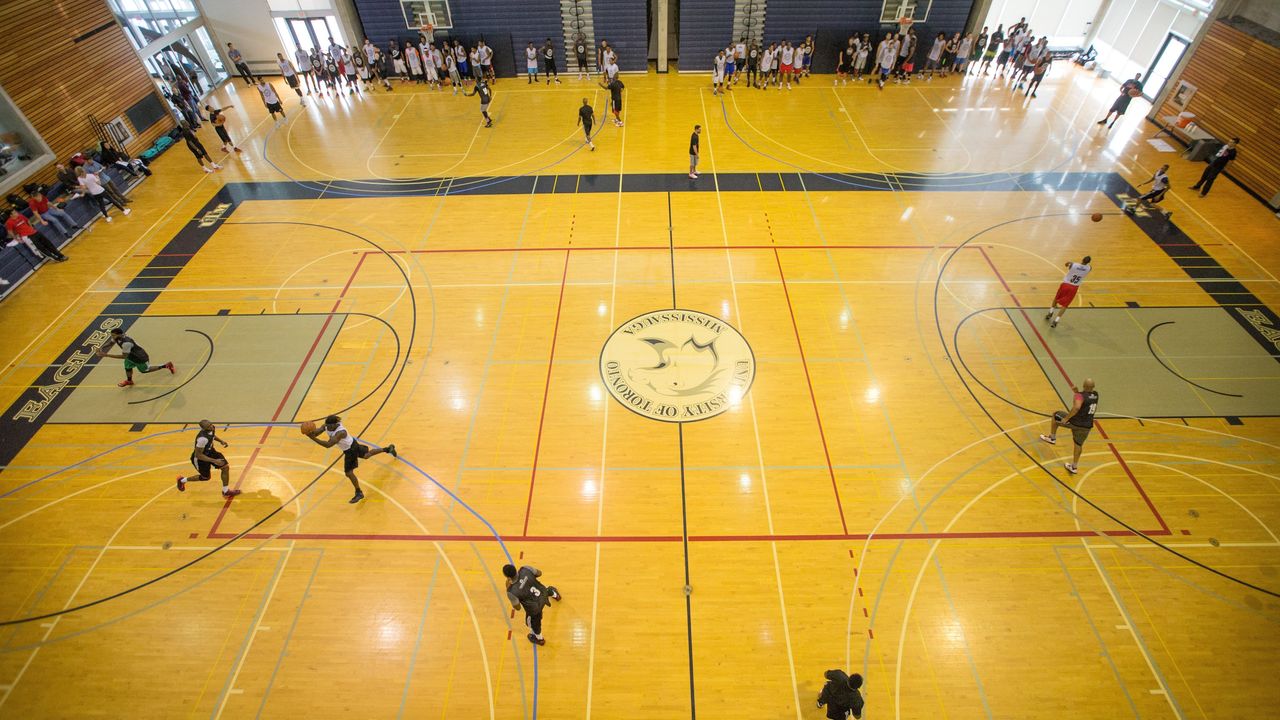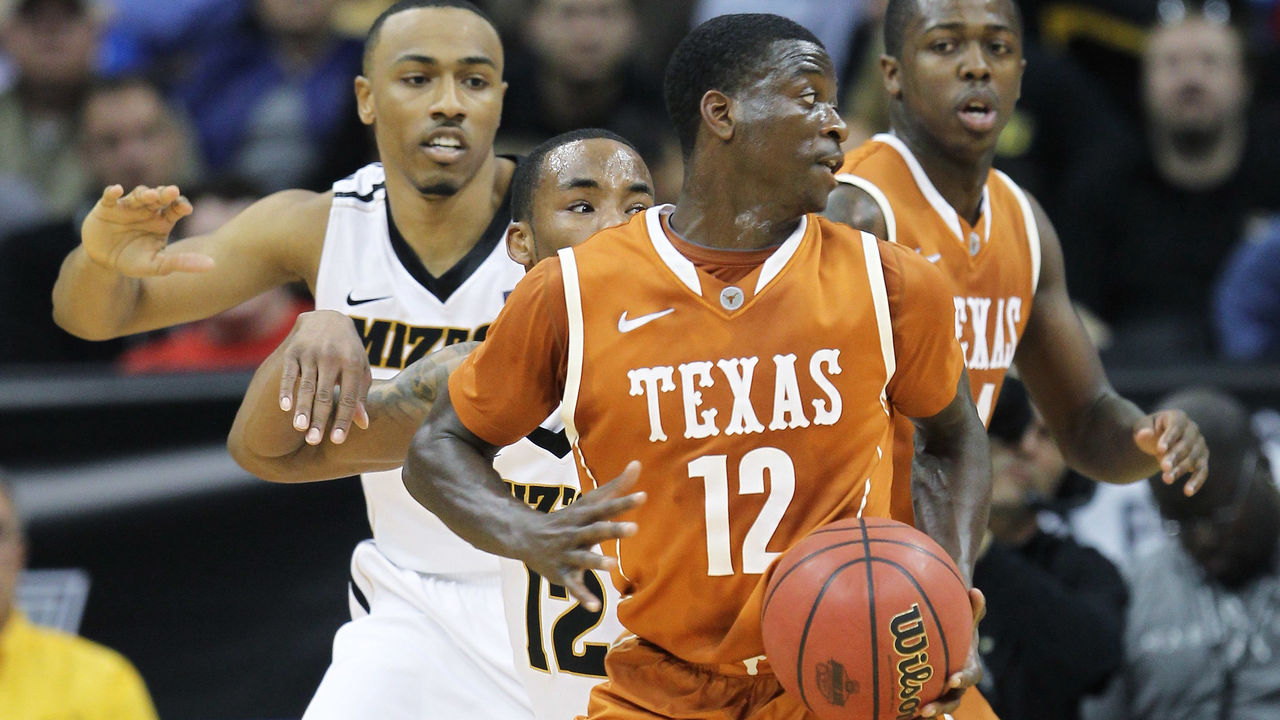Swallowing pride and gaining perspective at a pro basketball tryout
It would be disingenuous to say I tried out for the Raptors 905.
Yes, I was the latest writer to get sent to an open G League tryout where I'd test my mettle against infinitely better players in a sport I publicly opine about, but I wasn't trying out in good faith. I've never played basketball at a level higher than intramurals, and I'm at best a mediocre pickup player; I can dribble, make simple passes, sporadically hit open jumpers, and understand where to be on the floor. It's not like my employer was sending me out to find another job.
I was uncomfortable with the assignment from the start. Not just because I knew I'd have nowhere to hide my painfully obvious inadequacies, but because it felt almost voyeuristic; a peek at actual pro-basketball aspirants risking something real in pursuit of an impossible dream. For me, failure was a foregone conclusion, so aside from personal pride I wasn't laying anything on the line. I still value my pride, and my self-esteem is as fragile as the next guy's, but the disparity in purpose and stakes made me feel like an interloper. I had no business sharing the court with these guys.
As the smallest person at the tryout, I also had to wear my physical shortcomings on my sleeve. (Compounding the indignity, I had to take a size-large jersey, the smallest on offer, which drooped off me like a nightshirt.) After signing in, I tried to scurry away from the growing line at the registration desk, but the administrators called me back to ask my height. I sheepishly told them: 5-foot-7. Again I tried to walk away, and again they called me back, this time to ask my weight. Blood creeping into my face, I told them: 140 pounds.

There was an hour of open shootaround before the tryout officially started and I wavered between wanting to get in some kind of rhythm while also wanting to limit my exposure. I still had my shroud of mystery, at least. Someone with my physical proportions would have to be insanely skilled to thrive in this setting, so as people eyed me skeptically, I imagined them wondering whether I secretly had a lethal crossover or a dead-eye pull-up jumper. I found the basket with the fewest shooters on it and intermittently hoisted mid-range shots, mostly avoiding dribbling lest it become obvious that no, I did not have that killer crossover in my bag.
Then the tryout began, and the jig - or whatever was left of it - was up. After a brief warmup, we moved on to skill-based drills. Rapid-fire layups, elbow jumpers, free throws, and 3-pointers. The three- and five-man weave. A drill that involved doing a dribble-drive followed by a Eurostep followed by a floater. (The coordination and body control required took me by surprise, and I air-balled the floater.) We did one-on-one drills, in which I couldn't create separation, and got swallowed up, backed down, blown past, and shot over like I wasn't there. I felt a newfound empathy for Isaiah Thomas.
I was stressed out the entire time. I imagined how it felt for those who were earnestly playing for a life-changing opportunity. My only motivation was to avoid totally humiliating myself. I still competed hard, still whinged and cursed when I blew layups or caught back iron on jumpers that felt good coming out of my hands, but ultimately I knew it was all functionally irrelevant - my makes and misses didn't matter.
At a certain point I dropped the pretense and started telling people about my ulterior purpose, mainly because I needed them to know I wasn't trying out in earnest - that I was not, in fact, a delusional wannabe who thought he could make a pro basketball team because he hit a few jumpers in a YMCA run. After I'd blown my own cover, Raptors 905 general manager Chad Sanders validated my decision.
"You have people like us who are realists, and other guys who really think they can make it," Sanders said when I asked about the typical participants at an open pro tryout. "Then some guys who say, 'We're just doing this for fun.'"
I couldn't imagine how this could be fun, at least for someone like me, who was plainly out of his depth.
We constantly got split into groups for drills and scrimmages, and the coaches arranged us in a line from shortest to tallest. Eventually, I became chummy with Umesh Sharma, the second-shortest participant, because we kept ending up beside each other in that lineup, invariably swapping tales of our latest misadventures.
"I keep getting outmuscled," he told me exasperatedly at one point. "Like, damn, these guys are too big!"
Umesh, I discovered, is a med-school student who studies in St. Kitts and bounces between Toronto and Winnipeg when he's home from school. He last played competitive basketball when he cracked his university's junior team several years ago, and at this point he's focused on becoming a doctor. So, what was he doing at the tryout? In short, during a period of familial trauma, his mother decided it would help shake him out of his grief-induced stasis, signed him up, and wouldn't let him back out.
"2018 was a tough year for us," Umesh told me. "My grandma passed away, then my grandpa passed away a few months later. My mom and my uncle and aunt had to go out to India, my sister and I stayed out here in Mississauga with my dad, and when my mom came back from India she heard the commercial for the open tryout, talked to my sister, and they forced me into it. I was not in the mood, but eventually I listened to them and I got into it. For me it was more just to kind of take in the experience and learn from it, maybe take something back home for the teams that I coach."
Having a commiserator made the experience a lot more tolerable for me.
Another turning point came when Jama Mahlalela, a former Raptors assistant who's now the 905's eminently charismatic head coach, brought us together after the morning drills for an inspiring pep talk about the ways we grow through basketball.
"The outcome of this tryout doesn't define you," he said. "This game is incredible. It has something to teach all of us." He praised our courage, and said he was proud of us for taking a chance on ourselves. Even though I knew his speech wasn't really intended for me, especially since I hadn't come by choice, I found myself deeply moved. I am taking a risk, I thought. I do love this game. I am growing through it. Damn, Jama.
"I think it's a talented group. I wasn't sure what I was going to walk into," Mahlalela told me later when I asked how the event measured up to his expectations. Then he smiled and clapped me on the shoulder. "Except, you know, with some people."
Damn, Jama.

In the afternoon, after running through drills meant to teach us the 905's drive-kick-swing offense - predicated on floor-spacing, ball-movement, and snap decision-making - we broke off into groups to put it into practice and play five-on-five. I was going to recuse myself, wary as I was of compromising the integrity of the scrimmages (I'd sat out a four-on-four portion of the morning run), but Umesh, of all people, convinced me to participate.
"Come on, man, we're here," he said. "Let's just have fun."
Fun. That word still didn't register. But I felt a strangely compelling obligation to my tryout companion, who was out there playing for reasons that seemed bigger than basketball, just trying to make meaning out of his experience and to help me do the same. So, I swallowed the dregs of my pride and got down to the business of doing my best T.J. McConnell impersonation.
With comparatively little skin in the game, I struggled to match the urgency and intensity of the scrimmages, but there were moments that made me feel genuinely good. A booming "Nice hustle!" from one of the coaches when I tracked down a loose ball; a rousing applause from my bench when I played eight seconds of chest-to-chest perimeter defense. On offense, I just tried to stay out of the way. I camped out in the corners, and on a couple occasions attacked a closeout and dumped the ball down to the guy in the dunker spot. I wouldn't call it fun, but I took some satisfaction in ably playing within my limits. And that's how I ran out the clock on my G League tryout.
This isn't a unique or novel realization, but what struck me most about my whole experience was the absurdity of my position, as someone who gets paid to write about and appraise people's aptitude for something at which I myself am embarrassingly unqualified. While I was clanking jumpers and filing away mental notes and trying to disappear inside my oversized jersey, immensely worthier players - many of whom already play pro ball in some capacity - were busting their tails for a long-shot chance to earn a G League training-camp invite, where they'd have a long-shot chance to land a 15th roster spot on a team that pays a base salary of $35,000, where they'd have an even longer shot at promotion to the NBA, where they'd earn the right to be called a scrub by schmoes like me.
But the allure and possibility presented by a potential stint in the NBA's feeder system obviously goes well beyond money or mainstream acceptance. It's a goal that feels simultaneously modest and outlandish.
With a gym full of 70-plus guys competing for the four camp spots that would represent the first step toward that goal, I'd expected to encounter an atmosphere rife with desperation. But it wasn't like that at all. The mood was light. Everyone just seemed happy to be there, and grateful for the opportunity. There was no shortage of hunger and competitiveness, but guys mostly pulled for each other. And every participant seemed to have their own unique intentions and expectations.
There were guys like John Arif, who played high-school ball but always harbored hopes of taking his game further. "It's always been a dream to play (pro) basketball, I just never got the opportunity," John, now 32, told me. "Growing up, my parents were really never supportive of it. I saw this opportunity come up and I said, 'If I don't even try, I'm going to regret it for the rest of my life.' Whatever the outcome is, I can at least say I came in and gave it a shot. I've always loved the sport."
There were guys like Meshack Lufile, who's played pro ball in the Netherlands and in Canada's NBL, hails from a family of basketball players (his brother Chadrack played for the 35-1 Wichita State Shockers in 2013-14), and delights in any opportunity to be around the highest levels of the game. "I was one of the shorter ones here, which never happens," laughed Meshack, who's more than a foot taller than me. "This was always a dream for me, to play for the Raptors and represent them. Being here in this atmosphere with all these players, being able to see the different talent in the city, it's pretty impressive. Guys enjoyed themselves, and I think that's the biggest thing, just bringing a basketball community together."

And there were guys like Myck Kabongo, a spindly Congolese-Canadian point guard who was once a McDonald's High School All-American and a top college recruit who started every game for Texas as a freshman and seemed destined for the NBA, until he wasn't. He was suspended 23 games as a sophomore for impermissible contact with agent Rich Paul, subsequently declared for that year's NBA draft, and went unselected. He's 26 now, having played in the G League and most recently in France. A scout I talked to at the tryout, who was there on behalf of the NBL's Saint John Riptide, buzzed about Kabongo. But the NBL wasn't at the front of Kabongo's mind on this day.
"It's a chance of a lifetime, right?" he told a small media gaggle at the tryout. "You're a step away from the NBA."
Everyone I spoke to had a different background and a different story, and I barely scratched the surface. If the only real goal in all this was to make the G League or the NBA, then most of the talent, desire, and persistence I encountered in that gym would be for naught. Fortunately, few people seemed to see it that way.
For me, it was a predictably humbling experience. It's not that I'd come in with any illusions about my own skills, or about the preternatural ability and force of will required to even consider pursuing pro basketball. But being aware of that reality was not the same as feeling it. Sometimes it's helpful to be reminded that success and failure are always relative, and that perspective is everything. At the end of the day, this game has something to teach all of us.